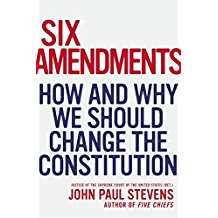Six Amendments: How and Why we Should Change the Constitution, John Paul Stevens, 2014
Former Supreme Court Justice Stevens draws on his 35 years on the Court to suggest that the Founders by intending to ‘form a more perfect Union’ had always planned on having the Constitution amended as the world and circumstances evolved. Stevens summarizes the first 28 Amendments and goes on to suggest six more. The Bill of Rights containing the first 10 amendments addressed the following: First, free speech and no established religion; Second, well-regulated Militia; Third, free from quartering soldiers in time of peace; Fourth, freedom from unreasonable searches; Fifth, five separate guarantees regarding grand jury in felony and capital cases, protection from self-incrimination, double jeopardy, right to due process, and right to just compensation for property; Sixth, right to lawyer, speedy trial and confronting witnesses; Seventh, right to jury in civil cases; Eighth, freedom from cruel and unusual punishment; Ninth, addresses rights not enumerated; Tenth, states rights. The Eleventh (1795) precludes Federal involvement in matters between citizens of different states. The Twelfth ( 1804) revised the Electoral College procedures. The thirteenth ((1865) abolished slavery while the Fourteenth (1868) awarded citizenship and the Fifteenth (1870)granted the right to vote. The Sixteenth (1913) is the source of power to tax income and the Seventeenth (1913) provided for direct elections of senators. The Eighteenth (1919) was Prohibition and was repealed in 1933 by the Twenty First. The Nineteenth gave women the vote and the Twentieth advanced the start of the President’s term from March to January. The 22nd (1951), limits the President to 2 terms. The 23rd provided for DC to have a Congressman and an electoral college vote. The 24th (1964), abolished the poll tax. The 25th (1967) specified procedures for filling a vacancy in the VP office and transition if the President is incapacitated. The 26th (1971) changed the voting age to 18. The 27th (1992) prohibits Congress from changing its salary between elections. Stevens then goes on to propose amendments dealing with six important topics: anti-comandeering, political gerrymandering, campaign finance, sovereign immunity, the death penalty, and gun control. A book well worth reading by all citizens.



